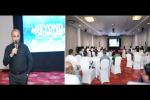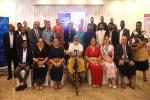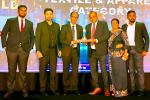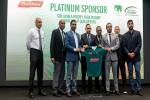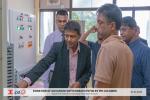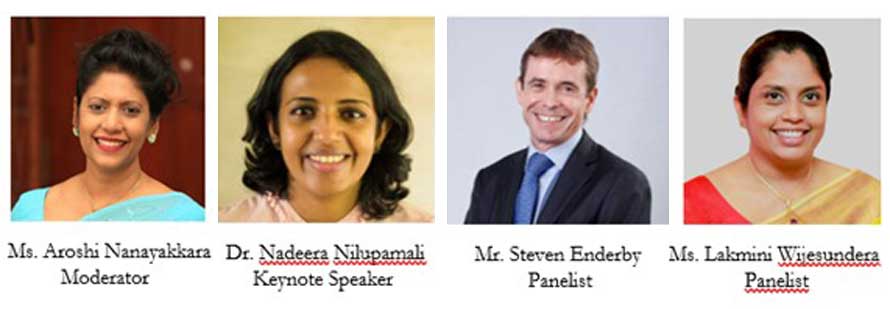The keynote address was delivered by Dr. Nadeera Nilupamali PhD, a virologist, immunologist, epidemiologist and Co-founder of Sri Lankan healthcare technology startup ImmunifyMe.
Launched in 2017 ImmunifyMe has broken geographical boundaries to enter many markets worldwide.
Dr. Nilupamali took the opportunity to highlight the challenges they faced as a young startup company in a globally competitive healthcare technology market and the successful strategies they used to steer the company through the pandemic.
The eminent panel included Steven Enderby-Chairman, Ironwood Capital Partners and Lakmini Wijesundera-Co-founder and CEO of IronOne Technologies (Pvt) Ltd and BoardPac.
The session was moderated by Aroshi Nanayakkara- Vice Chairperson of SLID, CEO of Global Consulting Company and Independent Non-Executive Director of Sampath Bank PLC and Hela Clothing (Pvt) Ltd.
“Over 3 million children die every year all over the world due to vaccine preventable diseases.
One of the main reasons for this appallingly high number is the that we use a 70-year-old paper-based vaccination record which results in the inability of the policymakers to make critical decisions in a timely manner.
ImmunifyMe is a cloud-based ecosystem which digitizes the immunization recordkeeping process thereby bridging the immunization gap and has won many international awards and grants including the prestigious GAVI Influencer Award which is the World Health Organization Global Vaccine Alliance” said Dr. Nilupamali.
“We are facing unprecedented times during this pandemic which poses great challenges and threats to entrepreneurs and their organizations.
However, it is important to note that every crisis brings about unique opportunities too.
Entrepreneurs need to focus and understand the opportunities that are lying ahead.
With the onset of the pandemic, we identified 3 main roadblocks.
First and foremost, we were unable to travel for in-person meetings which is the most effective.
The second was the difficulty in pitching for a product/service that requires live demonstration.
The third was natural delays occurring due to unavailability of tangible material.
This was a disaster for a new product line since we were unable to pitch effectively to global clients” she added.
As a workaround to reach global clientele, ImmunifyMe reached out to local embassies and consulates for their support which proved to be very encouraging making headway with many potential assignments with many more in the pipeline.
ImmunifyMe also took advantage of the trend of people turning in their masses to online media during the pandemic to launch their contact tracing app which went viral.
They also used the web to identify companies and organizations which provided financial support and to identify non-traditional players whom they could partner.
Highlighting the need for innovation and out of the box thinking, Dr. Nilupamali said that a crisis also provided opportunities to succeed by re-evaluating and switching priorities to suit the situation.
Forging alliances with competitors and working closely with them was also a strategy used by ImmunifyMe during the crisis.
They also used the time that was freed by working from home to make improvements to their products, conform to higher international standards which is crucial for success in the healthcare marketplace, employee training, insourcing some outsourced work to reduce costs, researching and finding new markets etc.
Concluding her keynote, Dr. Nilupamali stated that any adversity or problem can be overcome as a team with continuous dedication.
Panelist Steven Enderby sharing his thoughts on how large companies keep innovating themselves said that crises often create the required impetus for large established organizations to change processes structures and strategies built over decades which had brought success over the years.
“One of the reasons why great businesses do not survive is because they are reluctant to change.
A crisis such as this pandemic drives change as there is no other option than to change in order to continue to service the market and customers.
What was done last year will not hold good anymore. One needs to find different routes to the market.
Furthermore, in these types of environments, leaders should strive for long term structural change.
One of the reasons that I found really liberating within the pandemic environment was that all of a sudden there is no time for arguments and those endless meetings about why we cannot change. You’ve just got to get on and do it” he added.
Speaking on the need for innovation during a pandemic, Lakmini Wijesundera said “Innovation is any kind of difference or change, so we had to do a lot of changes.
To survive we could not go with the same customers: they started thinking differently and wanted different things, competitors came out with new products and features. Innovation should be continuous even during a pandemic.
In the absence of innovation, competitors will catch up and overtake you.
So, product-wise we innovated.
Also, our sales and marketing footprint expanded during the pandemic to countries that we never targeted with client inquiries flowing in”.
Reaching out to entrepreneurs, she added “The pandemic struck us at a time that we were growing.
We did not expect not being able to meet our clients face to face which is preferred by our audience.
However, we have overcome this challenge and it has been an interesting journey.
It is just a matter of focusing on what you like to do and enjoying it.
Saddle up for some hard but enjoyable work”.

